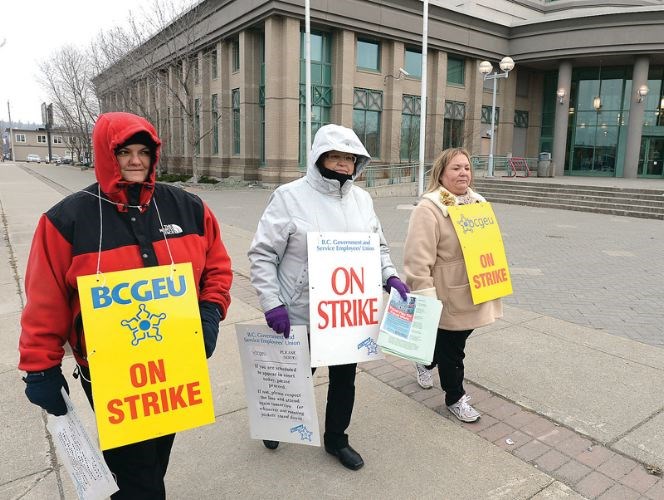Native court workers based at the Prince George courthouse staged a one-day strike Thursday in support of a quest to have their pay increased to a level they say is equal to others doing similar work.
The starting salary for the position is only $31,800 a year, compared to $45,100 for a comparable classification, according to the B.C. Government and Service Employees' Union which represents 22 native court workers provincewide. Their job is help aboriginal clients navigate the criminal court system.
Wearing placards and braving frosty winter weather, they handed out information and encouraged passersby to sign letters urging Justice Minister Suzanne Anton to budge on the issue.
The move represents an escalation from a month ago when they limited their action to handing out information on their position. The latest effort is part of a series of rotating strikes the workers are staging at courthouses across the province after voting 98 per cent in favour of striking in late September.
"It's disappointing that we're undervalued for providing that kind of service," said Christina Draegen, one of the three native court workers at the Prince George courthouse.
The workers are employed by the Native Courtworker and Counselling Association of British Columbia, a non-profit that provides services in 20 B.C. communities. Executive director Darlene Shackelly said the NCCABC budget has been cut to the bone and the only way to meet the demand is to convince the Ministry of Justice to release more funding.
"We are now heading towards a deficit budget and we just do not have the money to pay the salaries," Shackelly.
She said it would cost $400,000 to address the issue, exactly the same amount as the 10 per cent budget cut the provincial government imposed on most non-profit organizations in 2005.
"It's not like we're asking to over inflate our budget," Shackelly said.
Shackelly sounded hopeful the money will be found by the Ministry of Justice after talking to a senior bureaucrat on Monday.
The BCGEU blames the difference on the failure of the B.C. government to bring these workers into the Community Social Services Employers' Association (CSSEA) Aboriginal bargaining unit when it was created in 2003.
Native court workers haven't had a wage increase in five years and have only seen a nine per cent pay increase since 2002, while inflation has been 18 per cent over that time, the BCGEU said.
The First Nations Leadership Council has also come out in support of the court workers.
"Providing the necessary level of funding for a robust program as well as competitive wages, or at a minimum comparable wages, ensures the NCCABC will be able to maintain stable and committed staff and therefor fulfill its important mandate," the council said in a letter to Anton and Premier Christy Clark.
Cindy Rose, a spokeswoman for the Ministry of Justice's corrections branch said that although the ministry is not directly involved in the dispute and negotiations, officials have met with the NCCABC and "has discussed the pressures faced by the association. We are hopeful that a resolution will be found as quickly as possible."


